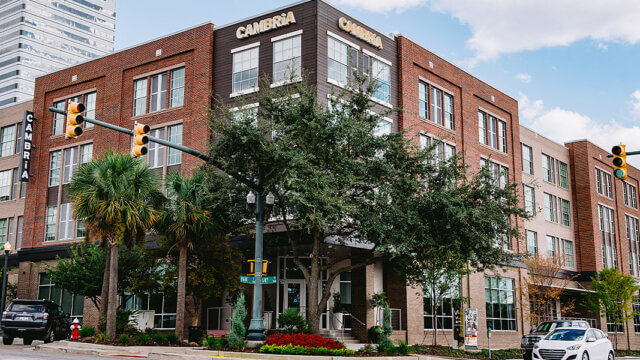SEATTLE, WA—Expedia Group Inc. has reported that following the bottom of the trough in April, the company saw consistent improvement in gross bookings through May and June, as well as moderating cancellations. With the virus continuing to create volatile short-term changes globally, the company is focusing on long-term strategic work, including reshaping and simplifying the organization.
For the second quarter of 2020, total gross bookings decreased 90%. In April, cancellations exceeded bookings, resulting in total gross bookings being negative for the month. Following that, as some countries got a handle on the coronavirus and some travel restrictions were lifted, total gross bookings turned positive in May and the year-over-year decline moderated further in June, led by growth at Vrbo, Expedia Group’s alternative accommodation business.
“I would point out that we view this not simply as a positive for the business in the short term, because obviously our numbers remain very challenged relative to prior periods, but I think it speaks to humanity’s demand and desire to travel and that when they can and when the opportunity avails itself and when they feel safe and there are no restrictions, people are really dying to travel,” said Peter M. Kern, vice chairman and CEO, Expedia Group Inc. “And we’ve seen that this summer, and I have every expectation that we’ll continue to see that hopefully as the world opens up more.”
He added, “But we will have a bouncy recovery. There’s no question. We’ve seen virus numbers go up in certain places. We’ve seen new restrictions come into certain geographies. And it appears like that will be the state of the union until things change scientifically. And so we expect this not to be a linear recovery, obviously, and we expect some bumps in the road.”
Total revenue decreased 82% in Q2 with revenue declining significantly year over year in both April and May. The decline moderated in June due to the improved trends in the lodging business.
As a percentage of total worldwide revenue in the second quarter of 2020, lodging accounted for 86%, advertising and media accounted for 4% and all other revenues accounted for 22%, while air was a 12% detriment to revenue.
Lodging revenue decreased 78% in the second quarter of 2020 on an 81% decrease in room nights stayed, partly offset by a 15% increase in revenue per room night. Revenue per room night benefited from an increase in the percentage of room nights contributed by Vrbo, which has a higher revenue per room night than the rest of Expedia’s lodging business, and recognition of certain revenue related to stays in prior periods.
“In terms of our lodging results, ADRs were up 1% and revenue per room night increased 15%,” Eric Hart, CFO, Expedia Group Inc. said. “On ADRs, Vrbo…accounted for a much higher mix of room nights than it has historically and more than offset declines in hotel ADR. A similar dynamic impacted revenue per room night with the growth driven by the increase in mix and improved monetization at Vrbo.”
“By and large, we’ve seen exactly what you’d expect,” Kern said. “April was very tough for everybody. It was the bottom of the trough. We have seen consistent growth coming out of that. We were down on a net basis 90% for the quarter, but by June that was less than down 70%. And the lodging side of that was considerably better, down less than 60%. So all of that is a very good trend but still, obviously, well below anything we’d like to see in the business.
“As for July, I would say it’s roughly in line with June, slightly off those numbers,” he added. “What we’ve seen is Vrbo had a ton of business and has been a great leader for us in the recovery. As we got into summer, people obviously have a real interest in the whole home model and being able to have their families alone and not in shared space. And so Vrbo really led the way for us. There was a lot of compression in the early part of the booking window in the early part of the summer. And so as we’ve gotten to July, it’s still quite a strong business for us and way ahead of our other businesses, but that compression has softened a little bit. On the flip side, the hotel business has been slightly stronger even into July.”
Kern noted that with the current pandemic, there’s a lot the company can’t control. “We are keenly focused on everything we can control,” he said. “We’re focused on our own cost structure and making sure we are being efficient. But more broadly, we’re just focused on our internal functioning, our structure, our speed and agility and building for the future. And while we recognize it will take time for all of you to see the benefits of all that effort, that is really our focus.”
For instance, he said, “We took down our HomeAway brand in the U.S., which was something that was scheduled to take probably another year to do. And we deprecated it just a few weeks ago and have moved all that traffic to Vrbo. And now we will be a single brand in the U.S. and that will allow us to go much faster and do more around Vrbo.”
Additionally, the company folded its CarRentals business in Europe into Brand Expedia, sold Bodybuilding.com, and shut down Pillow and ApartmentJet, which were in its Vrbo business.
“On the tech side, perhaps even more importantly, we were able to accelerate a lot of technical projects we had in the works,” Kern said. “Our Media Solutions business had relied on a third-party vendor for its auction technology. We brought that technology onto our own platform just a couple of weeks ago here. That was about a quarter earlier than we expected to. And our teams were able to push that across the line, and now we have that much more time to optimize that platform. And that’s not just a cost savings from no longer licensing a third-party platform. But it also gives us much more latitude to grow that business. And we believe there’s a lot of upside there.”
Kern added that Hotels.com was able to move its mobile traffic to a new platform, a project that was scoped to take up to another six months that completed about a month ago. “It was another opportunity to just accelerate, get things done during the virus and get to the other side,” he said.
“And finally, just to name one more: We’ve talked about the opportunity for our virtual agents to help us on the costs and the customer satisfaction side,” he said. “It’s something you’ll hear again and again because it’s a big opportunity for us and one of our better platform technologies. But we launched that on our Egencia corporate brand and we launched it in the U.S. and France. And that was practically two years ahead of schedule.”
“So we’ve just been moving on every front we can to try to accelerate,” he said. “And that’s really all about being faster, getting simpler and being able to move the business much more quickly and agilely.”
Kern noted that the focus on long-term solutions isn’t because the company doesn’t care about what’s happening in the short term. “We just think there’s so much more upside in doing the real foundational work that we need to do, so if you don’t see us chasing every last dollar, that’s why we’re doing that work,” he said.




